 Mogambo features the cruelest beast in all of Africa—and its name is Clark Gable. 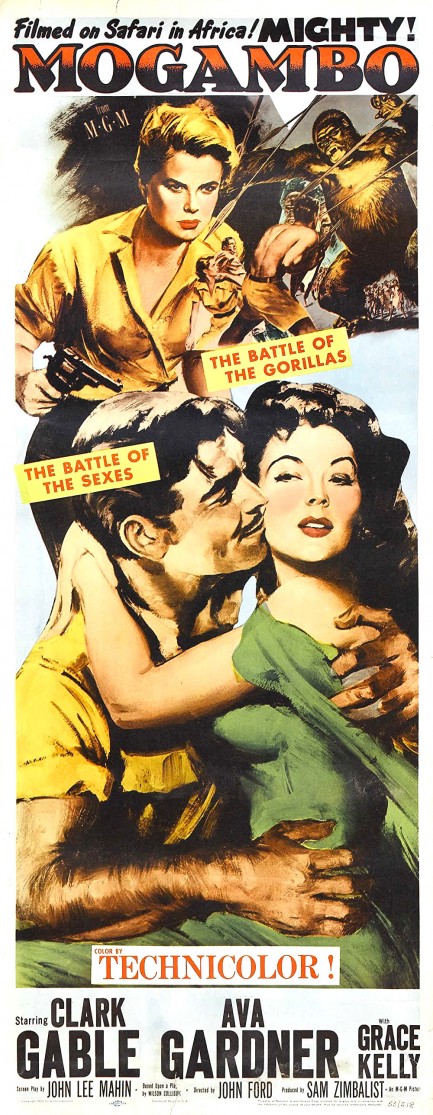
As famous as Mogambo is, we'd never seen it, had never read a review of it, and had no idea going in what it was about except that it was a safari movie and a remake of the 1932 adventure Red Dust, which we'd also never seen. There are few hit movies—especially with stars the stature of Clark Gable, Ava Gardner, and Grace Kelly—that we don't know at least a little something about. So we cleared the slate, cooked up some popcorn in our special Lindy's hand-cranked popper, and settled in for a screening.
Shot in Kenya, Uganda, French Equatorial Africa (now Central African Republic), and the Tanganyika region of what is now Democratic Republic of Congo, the movie is about a hard-edged safari guide and hunter played by Gable (also the star of Red Dust, by the way) who tries to score with both Gardner and Kelly, and soon has them at each other's throats. These old movies often work on the presumption that the male star is irresistible—period. As a result, screenwriters were sometimes lazy. They'd fail to write the male lead with any charm at all.
That holds true here, as Gable is gruff, rude, twenty years older than Gardner, and almost thirty years older than Kelly. We're fine about the age difference, unlike the “age appropriate” crowd that thinks women are capable of making any decision except ones about whom they love, but because Grant is a complete sourdough some charm would have made Gardner's and Kelly's attraction to him more understandable. Handsome though he may be, here he's nothing more than moustache, hair tonic, and bossiness. But okay, Gardner and Kelly are both in states of need, and Gable is more than happy to introduce them to his bush snake, so what you get is a love triangle folded inside a Technicolor safari adventure. Fine.
The production is spiced up with majestic scenery, nice costumes, realistic animal footage, an overwhelming feel of the exotic, the tantalizing implication of intimacy with two of the most beautiful women in cinema, and a deft, assured performance from Gardner. In fact, while Gable is top billed, Ava gets nearly all the good lines. “Listen, buster,” she scolds Clark, “you and your quick-change acts aren't gonna hang orange blossoms all over me just because you feel the cold weather coming on!” That's a scathing way to call someone old and desperate. But Gable has his moments too. We liked when he blustered, “You know how it is on safari. It's in all the books. The woman always falls for the white hunter and we guys make the most of it.” That's meta, so we hear.
Obviously, tribespeople figure prominently, and you can discern marginal improvement in their portrayal since the days of Weissmuller's Tarzan. They're still just ornamentation in their own lands, but at least none lay down their lives to save a white man who's spent most of his screen time cracking a whip at them. Whew. Overall, we thought Mogambo was decent. Not great, mind you—because Gable deserved to play a more nuanced character and did not have that chance—but it was decent. It premiered today in 1953.
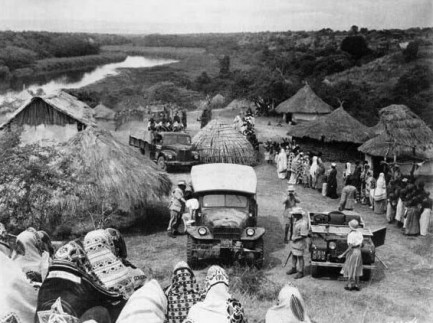 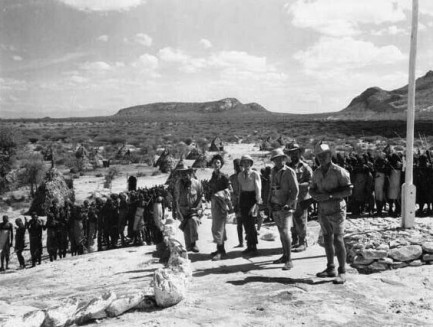 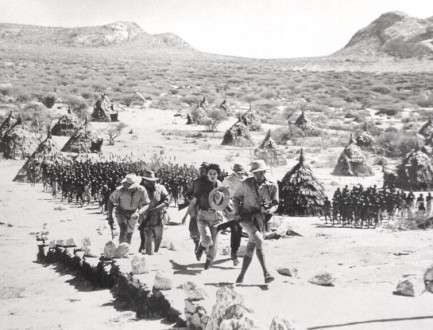 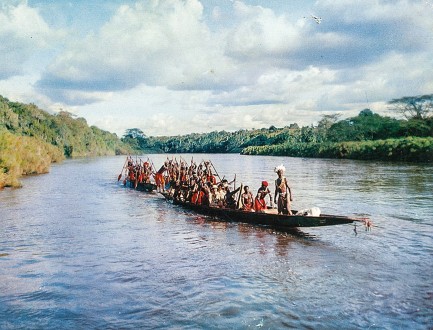 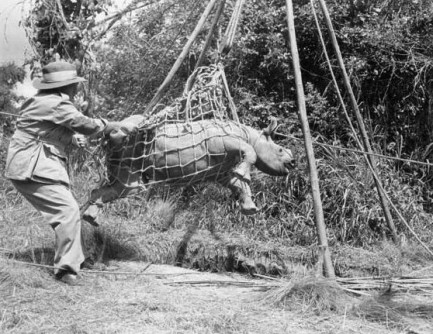 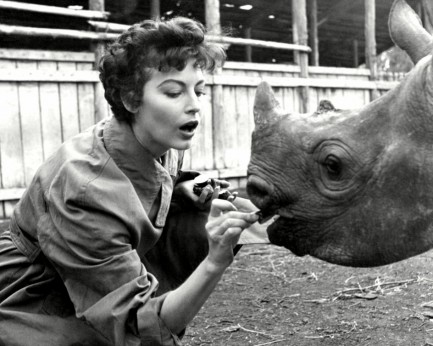 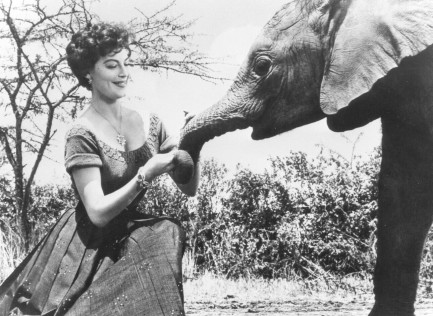 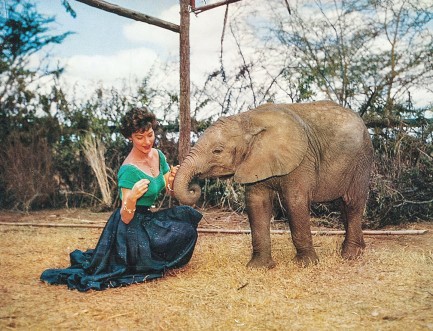 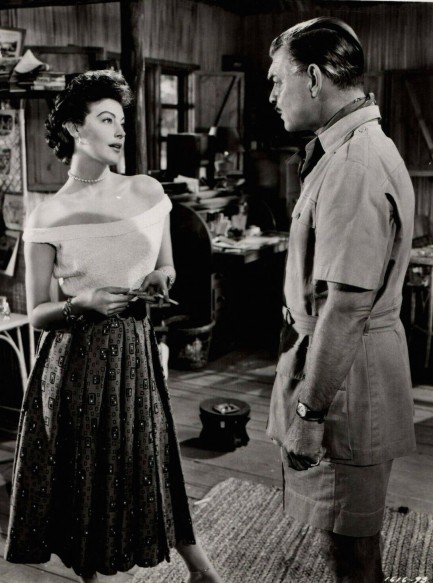 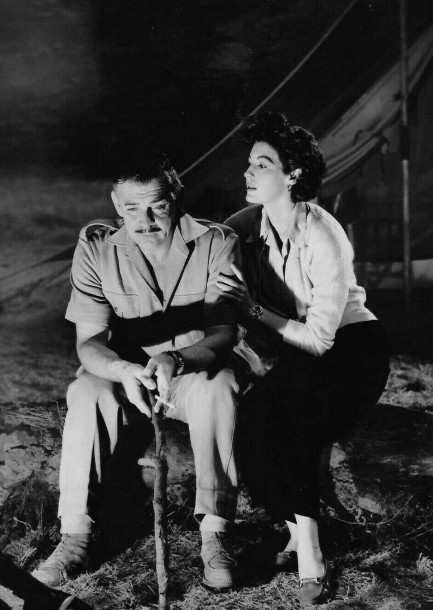 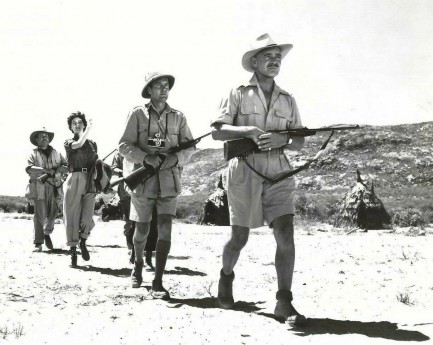 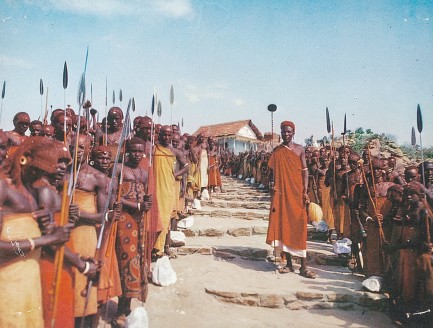 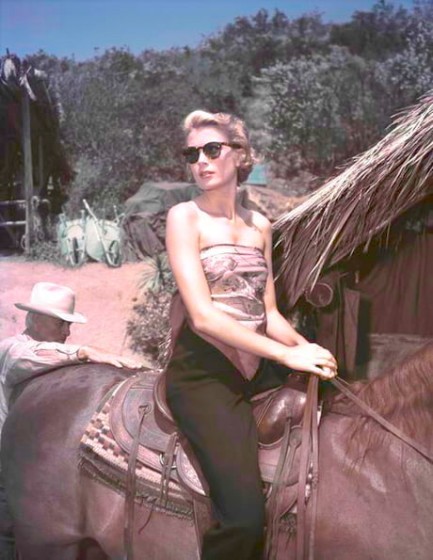 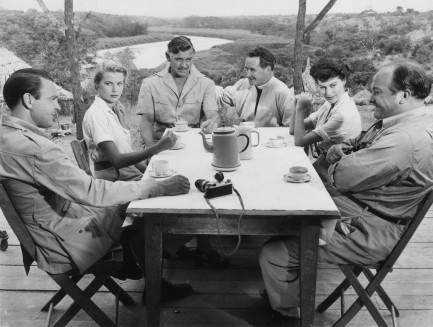 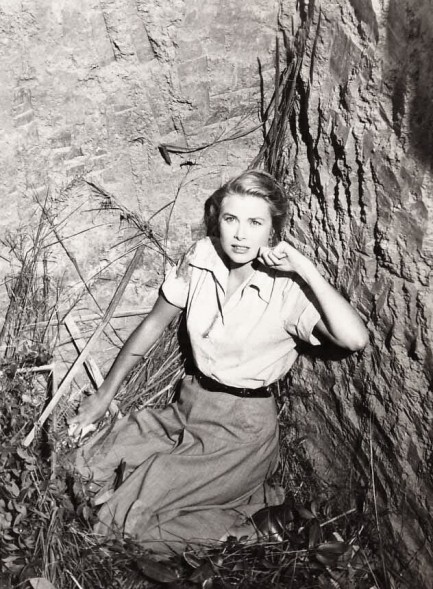 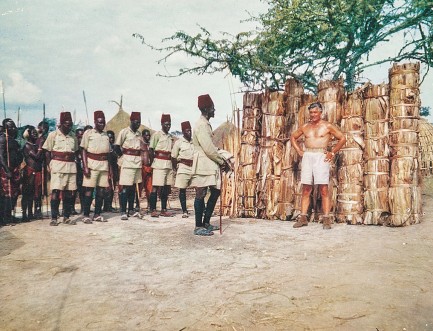 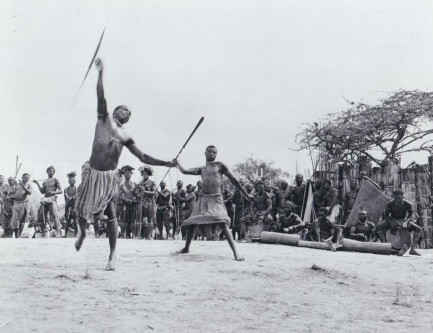 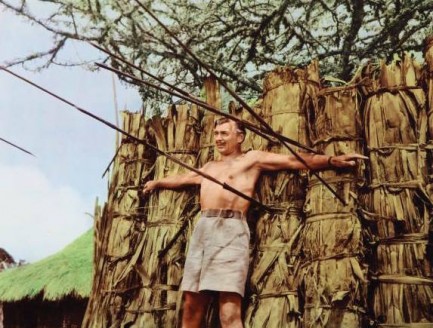 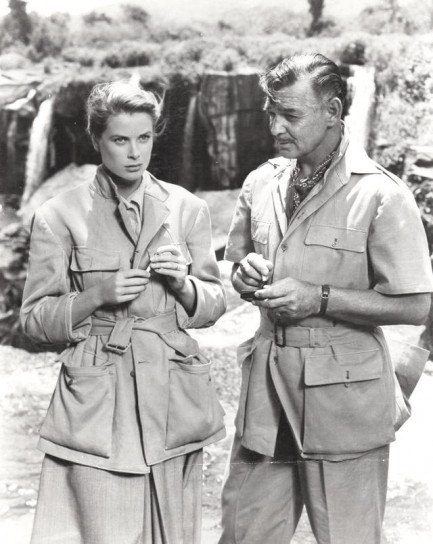 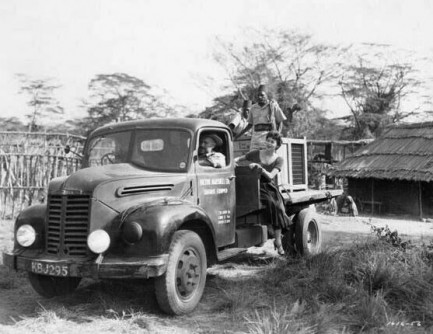 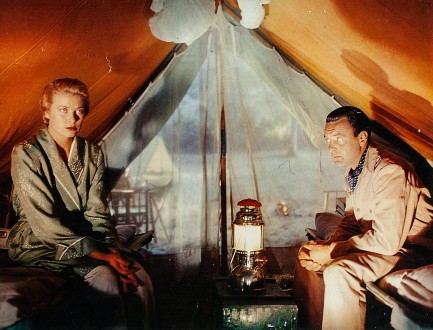 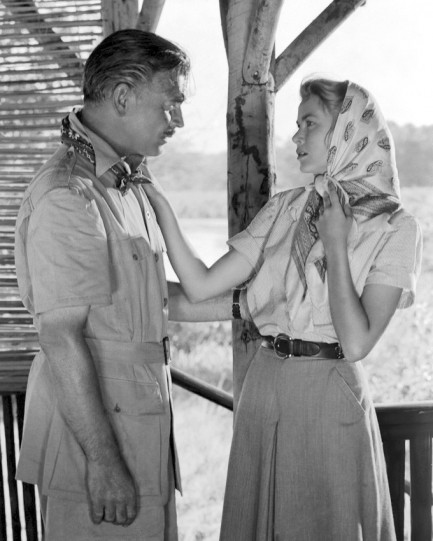 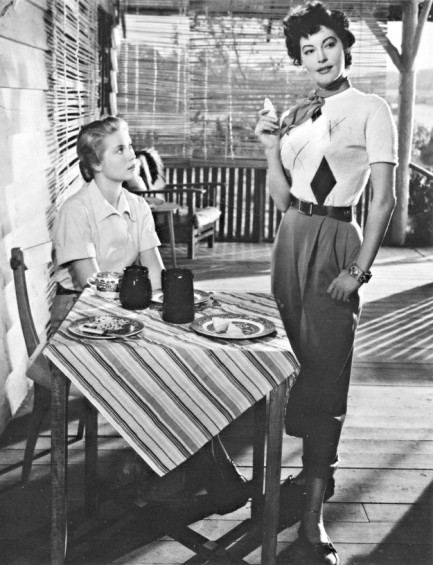 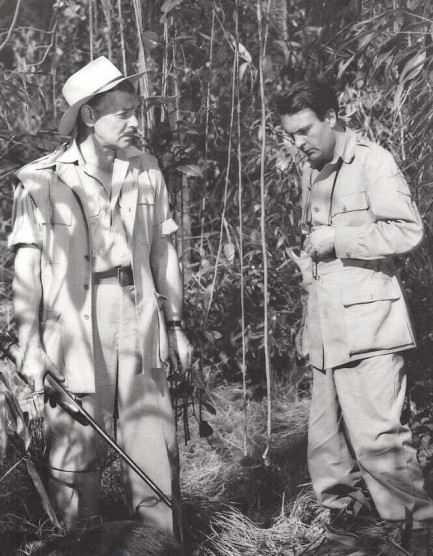 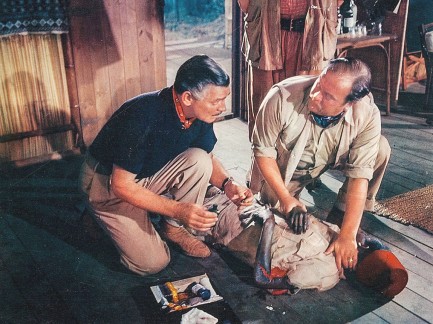 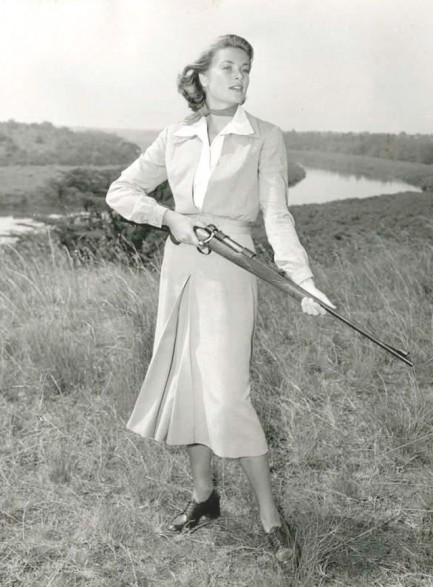 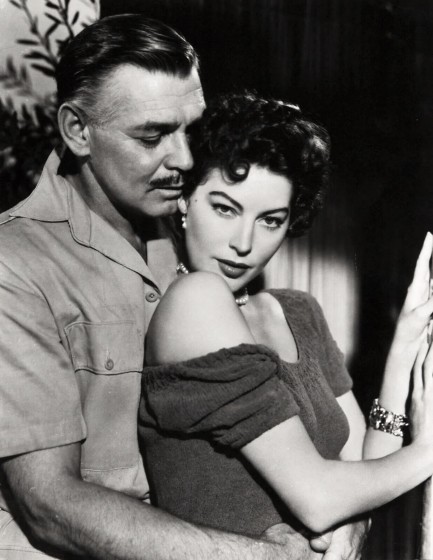   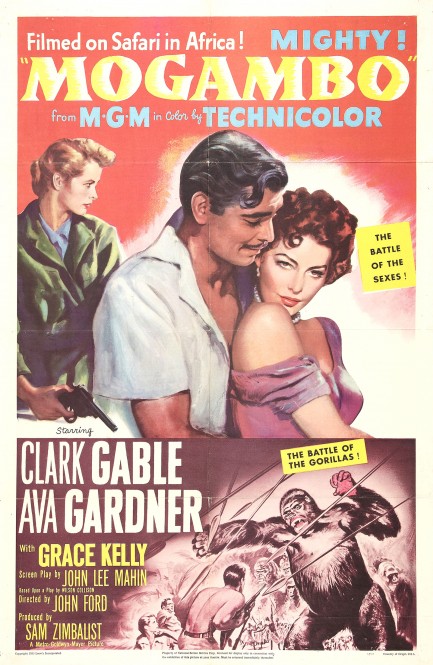
 Rampant reptile kills nineteen by triggering plane crash. 
 In the Democratic Republic of Congo earlier today, nineteen passengers and crew were killed when a Filair Let 410 commuter plane crashed. The craft, which was exactly like the one pictured above, was en route from the capital Kinshasa to the city of Bandundu, about four-hundred kilometers to the northeast, but went down near the end of the flight. In the Democratic Republic of Congo earlier today, nineteen passengers and crew were killed when a Filair Let 410 commuter plane crashed. The craft, which was exactly like the one pictured above, was en route from the capital Kinshasa to the city of Bandundu, about four-hundred kilometers to the northeast, but went down near the end of the flight.
According to the news website Jeune Afrique, the lone survivor of the accident told an incredible tale: as the plane was on its final landing approach and was just miles from Bandundu’s airport, a crocodile escaped from a carry-on bag and began scuttling wildly through the plane’s aisle. Panicked passengers fled toward the forward end of the cabin and their combined weight caused the aircraft to flip over in mid-air and plummet earthward, where it smashed into a house. The photo above left shows the aftermath of the mishap. Early reports were quickly revised to indicate that the witness was not actually the only survivor—the crocodile lived through the ordeal too, only to be killed with a machete when rescue personnel arrived on the scene and found it crawling around the wreckage. No word yet on which passenger actually boarded with the croc, or whether it was a crazy assassination scheme that succeeded only because Samuel L. Jackson wasn’t there to foil it. In any case, Snakes on a Plane doesn’t seem so farfetched anymore.
 A tale of albinos...and the witchdoctors who slice and dice them for cash. 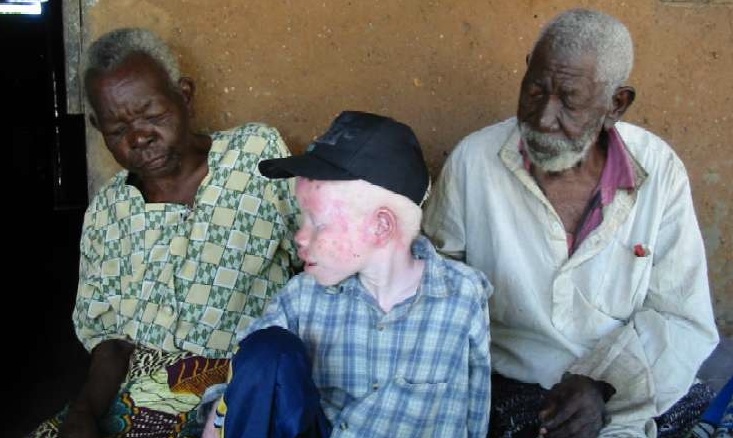
Tanzania has been recognized as one of Africa’s most politically stable and progressive nations since achieving independence in 1960. But this reputation has taken a hit since the killings of at least 30 albinos, perpetrated by men seeking body parts for witchcraft. Most of the killings have occurred in the past 10 months, including a grisly triple murder that took place hours after a large rally was staged in the capital city of Dar es Salaam to denounce the practice.
Among Tanzania’s population of 40 million are more than 200,000 albinos, whom superstition has surrounded since antiquity. But only recently have reports of killings begun to surface. The first confirmed albino killing for the purposes of witchcraft took place eight years ago, when half a dozen people were killed and skinned in Mbeya, in the southwest of the country.
Authorities say those involved in witchcraft—especially workers in the mining and fishing industries—believe albino body parts bring good luck. Demand is particularly high for albino skins, not just in Tanzania, but throughout a swath of Africa that includes Malawi, Zambia, Mozambique, South Africa, and the Democratic Republic of Congo. A single skin reportedly sells for anywhere between US $134 and $537. Killers also harvest victims’ arms, legs, hair, breasts and genitals, according to police. Local media have reported incidents of armless and legless victims who were left bleeding to death.
Zihada Msembo, who serves as secretary general of the Tanzania Albino Society and who is an albino herself, said, “When you sleep, you are unsure of waking up in one piece. They are cutting us up like chickens.” On her office wall hangs a photo of a limbless, partially skinned corpse, the result of a 2007 attack.
A Tanzanian woman named Susannah Rutahiro recently witnessed a killing, and gave a chilling first-person account that sounded like something out of a horror movie. She described eating dinner in an enclosed courtyard with her husband Nyerere when four men burst through the door and began to hack at him with machetes, screaming, “We want your legs! We want your legs!” What was left of her husband was laid to rest sealed in cement to prevent graverobbers from raiding his coffin.
|
 |

The headlines that mattered yesteryear.
2003—Hope Dies
Film legend Bob Hope dies of pneumonia two months after celebrating his 100th birthday. 1945—Churchill Given the Sack
In spite of admiring Winston Churchill as a great wartime leader, Britons elect
Clement Attlee the nation's new prime minister in a sweeping victory for the Labour Party over the Conservatives. 1952—Evita Peron Dies
Eva Duarte de Peron, aka Evita, wife of the president of the Argentine Republic, dies from cancer at age 33. Evita had brought the working classes into a position of political power never witnessed before, but was hated by the nation's powerful military class. She is lain to rest in Milan, Italy in a secret grave under a nun's name, but is eventually returned to Argentina for reburial beside her husband in 1974. 1943—Mussolini Calls It Quits
Italian dictator Benito Mussolini steps down as head of the armed forces and the government. It soon becomes clear that Il Duce did not relinquish power voluntarily, but was forced to resign after former Fascist colleagues turned against him. He is later installed by Germany as leader of the Italian Social Republic in the north of the country, but is killed by partisans in 1945.
|

|
|

It's easy. We have an uploader that makes it a snap. Use it to submit your art, text, header, and subhead. Your post can be funny, serious, or anything in between, as long as it's vintage pulp. You'll get a byline and experience the fleeting pride of free authorship. We'll edit your post for typos, but the rest is up to you. Click here to give us your best shot.

|
|


































 In the Democratic Republic of Congo earlier today, nineteen passengers and crew were killed when a Filair Let 410 commuter plane crashed. The craft, which was exactly like the one pictured above, was en route from the capital Kinshasa to the city of Bandundu, about four-hundred kilometers to the northeast, but went down near the end of the flight.
In the Democratic Republic of Congo earlier today, nineteen passengers and crew were killed when a Filair Let 410 commuter plane crashed. The craft, which was exactly like the one pictured above, was en route from the capital Kinshasa to the city of Bandundu, about four-hundred kilometers to the northeast, but went down near the end of the flight.





































































